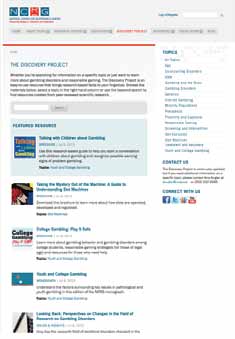The Discovery Project: Get The Facts At Your Fingertips!

“This is the type of site you will want to visit again and again to stay up to date with the latest information on gambling disorders and responsible gaming,” said NCRG Chairman Alan Feldman.
Last week, the NCRG unveiled its newest resource:The Discovery Project. Located on the NCRG website, The Discovery Project is an easy-to-use online library for finding the latest science-based information on gambling disorders and responsible gaming. It synthesizes the NCRG’s numerous resources—including videos, guidebooks, brochures and condensed information on research studies—and allows users to search for information by date, keyword, topic or content type.
To further enhance The Discovery Project, the NCRG also created topic-specific fact sheets that cover the most pressing topics in the field, including: the prevalence of gambling disorders; the impact of proximity and exposure to gambling on gambling disorders; brief screens and assessments; and more. Like all materials developed by the NCRG and included within The Discovery Project, the fact sheets were developed using findings from scientific, peer-reviewed research studies.
Feldman commented on why the NCRG created The Discovery Project:
‘For those who don’t regularly pore through dense research articles, the NCRG developed The Discovery Project. This useful tool breaks down the latest scientific information into easily understandable resources that can be used and shared.”
The Discovery Project will be continually updated to address and explain other relevant topics. The NCRG encourages you to visit The Discovery Project and hopes you will share it with your colleagues and friends.
Are there any specific topics you would like addressed within The Discovery Project? Leave your suggestions below.
NCRG staffICRG NewsNCRG ResourcesRaising AwarenessResearch-based factsThe Discovery Project

